
KIRSTEN HOLLY SMITH
Kirsten Holly Smith and Jonathan Vankin's new musical Forever Dusty, about the life of the great soulful pop singer Dusty Springfield, casts Smith, who has been seen in productions of Three Sisters, The Foursome, Of Mice and Men, Twelfth Night and The Best Little Whorehouse in Texas, in the title role. Directed by Randal Myler, the company at Off-Broadway's New World Stages also features Christina Sajous, Coleen Sexton, Benim Foster, Sean Patrick Hopkins, Ashley Betton and Jonathan C. Kaplan. The 95-minute musical about the life of Springfield, who was born Mary Isobel Catherine Bernadette O'Brien, tracks the late singer's often-moving story and utilizes songs from her many recordings, including "Son of a Preacher Man," "You Don't Have to Say You Love Me" and "The Look of Love," among others. A few weeks ago, I had the chance to chat with writer-actress Smith, who spoke about her affection for Springfield and the musical's long road to the New York stage; that interview follows.
Question: When did you first become aware of Dusty Springfield?
Kirsten Holly Smith: I first became more acutely aware of her when I met with Ahmet Ertegun at Atlantic Records. I was such a big Atlantic Records fan, and I knew of ["Dusty in Memphis"], but didn't become more obsessed with it until a friend of mine gave it to me. [My friend] said, "You have to listen to this," and that's when I started listening to "Dusty in Memphis," which is sort of the classic album that you start with with Dusty Springfield… Also "Pulp Fiction," which featured "A Son of a Preacher Man," also brought her to my attention. [When] I decided to do this project, [I] became more and more fascinated with her as time grew. I was looking at her and thinking, "Wow, what an amazing voice," and that's what drew me in first…the sound of that soul and what it was. What was that grit behind that voice, and where did that come from? And, that was the first thing that really pulled me into who she was. I didn't become obsessed with her [laughs] until I started researching her, and until I started learning about her story and learning about her music. That, to me, was more unbelievable than anything else—the choices that she made and who she was at a time [that] sort of intercepted with civil rights—making the choice to stand against apartheid in South Africa and her love of soul music, her love of R&B music, and being the first to produce a Motown concert in the U.K. She brought that sound to the masses, in a way, because it was produced on television in the U.K. That, to me, was just incredibly fascinating… She fell in love with this music and she was so inspired by it, and really so was I—always. I always felt that way about soul and R&B music, and I think that's why I'm so drawn to her in a lot of ways. I have a similar feeling about music and about life, and the choices that she made are probably choices I would have made, too, in a lot of ways if I were in her position—minus all of the, of course, kind of terrible things that she had to go through later in life with her addiction.
| |
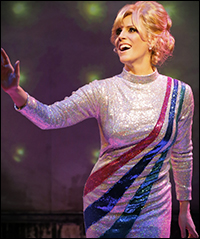 |
|
| Smith as Dusty Springfield | ||
| photo by Joan Marcus |
Smith: I started to work on it seven years ago, and what I did was I sang her songs at the Gardenia Club in Los Angeles at open-mic nights. I would go there once a week, and I would work up a song, and I would sing whatever song it was that week. And, slowly but surely, I started to do research on her—as much as I could get my hands on—and I would start to write monologues about her life. I would start to write monologues and think, "Okay, what song would go with this story?" That process was very organic. I was at the University of Southern California at the time, and I was in the screenwriting division working, and they had proposed a grant. And, I applied for the grant, and I won the grant, and it was a small grant, but it was enough of a grant to get the charts done for a musical. At the time, I wouldn't call it a musical, but it was sort of the genesis of the musical. [Laughs.]… I guess you would call it a one-woman musical, and that was the genesis of this project, and I had a deadline to perform it at USC, and I did, and that was in 2005. Jorja Fox, who was on a TV show called "CSI," was in the audience, and she decided that she wanted to help in any way she could. We brought the project to the Lily Tomlin Jane Wagner Cultural Arts Center, which is part of the Gay and Lesbian Center in Los Angeles, to Jon Imparato there, and they decided to produce it, and that took about a year for us to produce it there… It was a one-woman musical with backup singers on stage who rotated in as characters, and then there was a rock 'n' roll band, and it went very well. It was very well-received—critically—and audiences loved it as well, and it was just a really wonderful experience. The way that audiences have responded to this piece, even from the USC workshop, I knew that there was something in the story. People are moved by it, and I knew that there was something there, and I wanted to keep going. I didn't know exactly what that looked like at the time, but I knew that I wanted to keep going with it. Obviously, bringing it to New York is the final frontier with theatre, and I set my sights on doing that. I wanted to come to New York, and it was four years from the time that we produced it in Los Angeles… It was a long, hard and very challenging process, but I'm very proud of myself for hanging in there and not giving up. I could have given up very easily many times, and I didn't. That's something that I am incredibly proud of. There were so many obstacles that I couldn't even begin to share. [Laughs.] But it was really an exciting time for me, even though it was challenging, and it's especially exciting now since it's up in New York. It's just been an amazing experience, and it's a dream come true, really.
| |
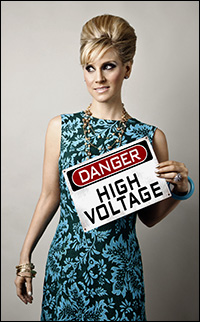 |
|
| Kirsten Holly Smith | ||
| Photo by Thom Kaine |
Smith: I always had her style in mind when I was singing… But I stayed more true, I think, to my own sound. What is great about that is that my own sound is very similar to hers in a way. [Laughs.] Obviously, nobody can be Dusty Springfield, and I don't try to be. What I try to do is be an artist who interprets a character, and I don't want to imitate her exactly. It's more about finding a way to make this character truthful within my own set of skills. And, I think I've always kept that in mind… It's just me, as an artist, interpreting this character for people to keep her memory and her spirit alive, which I think is very important. You know, it's a strong story. She was such an important character, and she was a contemporary with the Beatles and with the Stones and Petula Clark… She was such a powerful and brilliant artist, and it's important for people to continue to know about her. Everybody knows who the Beatles and the Stones are, and I have to say, because I've been doing this for so long and asking people—not everybody knows her name, especially in America. In England, of course they do, but in America, not everybody knows who Dusty Springfield is.
Question: How did the idea come about to expand from the one-woman show to more of a traditional book musical?
Smith: There had actually been someone on board who was working on moving it, but it didn't work out. But in the interim while that was happening, [my writing partner and I] decided to write a screenplay, so we wrote a screenplay. That was a very large bio-musical, and it was a lot more research, even more in-depth research about anything and everything we could get our hands on… We didn't know that the stage production was going to happen, [but] we sort of kept chugging along and pushing forward, and we decided that the one-woman musical [wasn't] helping audiences know her. I mean, it did introduce them to her, but we did want to go deeper to explore the themes and explore the people in her life and what that meant. And, knowing more about her story, even more than we had before, we decided that that was the story that we wanted to tell—to allow Dusty to interact with other characters or other people—composite characters or people in her life—that were meaningful to her… It's better to take that approach…especially when you're talking about somebody's life. I think it's a more cohesive story. It's a stronger narrative. It's more highs and lows. I think that it just helps to tell the story. I think it's challenging in the format that we're doing it. It's a quick format—meaning it's about a 95-minute musical… We could have focused on one piece of her life for this musical, but I have never felt compelled to do that in this format because I feel like you're reintroducing a character that people aren't as familiar with. And, when you don't know a piece of her life, it's hard to understand the choices and the decisions that character makes. To have the empathy with them that I think an audience needs to have, especially with a big character like her, I think you have to have some basis of where she came from or what she did, and I always felt strongly about that. I didn't think that just touching on—say if we focused on a certain section of her life—was a functional way that tells the story that really pulls people in…
I really feel like our songs drive the narrative, so we're not just going, "Okay, we're going to sing now, and we're going to sing this hit that you know." I really feel that the songs do move the story forward, and that's always been my intention from the beginning, from the one-woman show, that's why I started to pick stories that would go with certain songs, and that the songs do take you to another place. At the end of the song, you're driven to another place.
| |
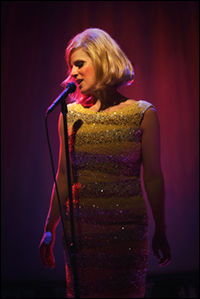 |
|
| Smith as Dusty Springfield | ||
| Photo by Joan Marcus |
Smith: I did. I mean, I talked to people in her inner circle [including] her musical director Larry White, who did her musical direction for several years and he was at Royal Albert Hall with her… I talked to people who knew her personally who were in her life. I knew people who were lovers. I did as much research as possible on anything on the internet, any material that I could get my hands on… But I did speak to people who actually knew her, and one of the stories about Royal Albert Hall that ends up in the musical—about her being two hours late and she was out shopping for shoes—is a true story. [Laughs.] It's really funny! She had enormous stage fright… I talked to Ronnie Spector, and she came to the opening, and she shared a dressing room with Dusty, and she talked about how Dusty would go buy cheap plates, and they would throw them against the wall before she had to go on stage. She's a fantastic character. I mean, it doesn’t get much better than that. Ronnie Spector said to me, "I shared a dressing room with her, and you did her proud." She just really had a great time, and that, to me, means [so much]. Paul Huntley, who is doing our wigs, knew her personally and did her wigs, and he came into my dressing room, and he just had tears in his eyes and said, "Wonderful. Absolutely wonderful," and honestly, that means more to me than anything. That's what it is. It's touching people. I mean, I had another man who knew her personally who came up to me last week with tears in his eyes…and he was like, "You're bringing her back. I was with her when she was dying." It seems that the people who knew her personally are the most moved…and that just means the world to me, it really does. I mean, that's what it was for… Younger audiences are loving it, too. I think you're seeing rock 'n' roll history on stage, which is always, I think, fascinating. She was inducted into the Rock 'n' Roll Hall of Fame by Elton John two months after she passed. She's a historic rock 'n' roll figure, and you see that… When you're a young person, or maybe you don't know the story, I think it's an important story to know. This is sheer rock 'n' roll history. [Laughs.] It's powerful in that way as well.
Question: What are the challenges in the role because you do do a huge amount of singing?
Smith: More of the challenge than anything else, I think, is just singing as much as I'm singing. It's landing in the scenes, I think, too—making sure I land in the scene. I do a warm-up, I do a cool-down. I gargle. I'm sleeping as much as I can sleep! [Laughs.] And, I'm taking excellent care of myself, physically and emotionally. It's like being an athlete in a way. If you were an Olympian or something, you have to take really excellent care of yourself and know what your limitations are. There's no way that I could go out and party in any way right now. [Laughs.] That's just not in the scope. It has to be pretty focused on my craft and what I'm doing every day because I just want to make sure that the audiences are getting the best show that they can, and that means me being in the best shape I can be in.
| |
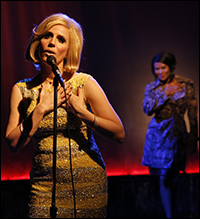 |
|
| Smith and Christina Sajous | ||
| Photo by Joan Marcus |
Smith: Yes. Just having that kind of support and being able to share the stage with this amazingly talented cast, including Christina, gives you a lot of the energy that you need to be with the project. As an actor, we're all giving it to each other… But I'm very, very blessed. All the people in the cast are very talented and have lots of training, and they're all really kind, too, which doesn't always happen! [Laughs.] They're all incredibly kind and generous, and we really like each other, which is a great feeling. It's a really great feeling, especially since we're a pretty small cast, so it helps we can just be together and have a great time on stage. All of us—it's our dream to do that for a living. To land there and have fun with the people that you're working with is really important, too.
Question: Is there talk of the show being recorded?
Smith: Yes. I don't have it in the budget right now to do the recording, but we would love to, obviously, so we're looking into it. And, somebody did come who does do recordings and is interested, but yeah, I would love to. [Laughs.] Especially, "Crumbs Off the Table" with Christina! [Laughs.] She's such a huge talent.
Question: Are you working on any other projects at the moment or is your energy totally focused on this?
Smith: It's totally focused on this right now. I have several other projects that I would love to do. I know what they are, but it's a matter of being able to give this life and having the focus and the time to be able to do that. It's pretty all-consuming at the moment. I don't think it will always be that way, but right now I think it is. [Laughs.] I'm happy that it's all-consuming.
| |
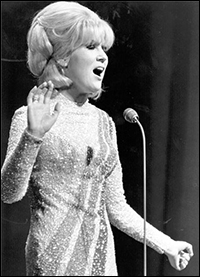 |
|
| Dusty Springfield |
Smith: I would love the audience to, quite simply, feel like they were told a really great story about a woman who, in a way, stood the test of time and how inspirational her story is and her music and the choices that she made. Although she didn't write the songs, she made the choice to sing [a particular] song at [a particular] time, and what's so wonderful about Dusty is that the music really—like I said—moves the story forward because the songs she sang were so incredibly personal to her. I want people to remember an icon and remember what, as human beings, we can do—just as a single person to help touch the world. I think that she was an example of that. She really did make choices—whether consciously or unconsciously—she made decisions that affected the world. And, I think each of us can make those decisions in our lives. [I hope audiences get] inspiration from her—from her stories and from the music—and also are just entertained. [Laughs.] I do hope it's entertaining! I hope people leave, and they're entertained, they're singing the songs, they're a little happier or a little more moved than they were before they sat down to watch the piece. I think that's what art is all about—being able to inspire people, to be able to create an emotional response that maybe wasn't there, and also just to educate them simply about who this person was.
[New World Stages is located at 340 West 50th Street. Tickets range in price from $69-$79, with premium tickets available at $110. There is also be a general rush policy in place, which will take place every day when the box office opens. Rush tickets are $26.50, cash only, and each person may purchase up to two tickets. For more information visit foreverdusty.com.] *
Well, that's all for now. Happy diva-watching! E-mail questions or comments to [email protected].









